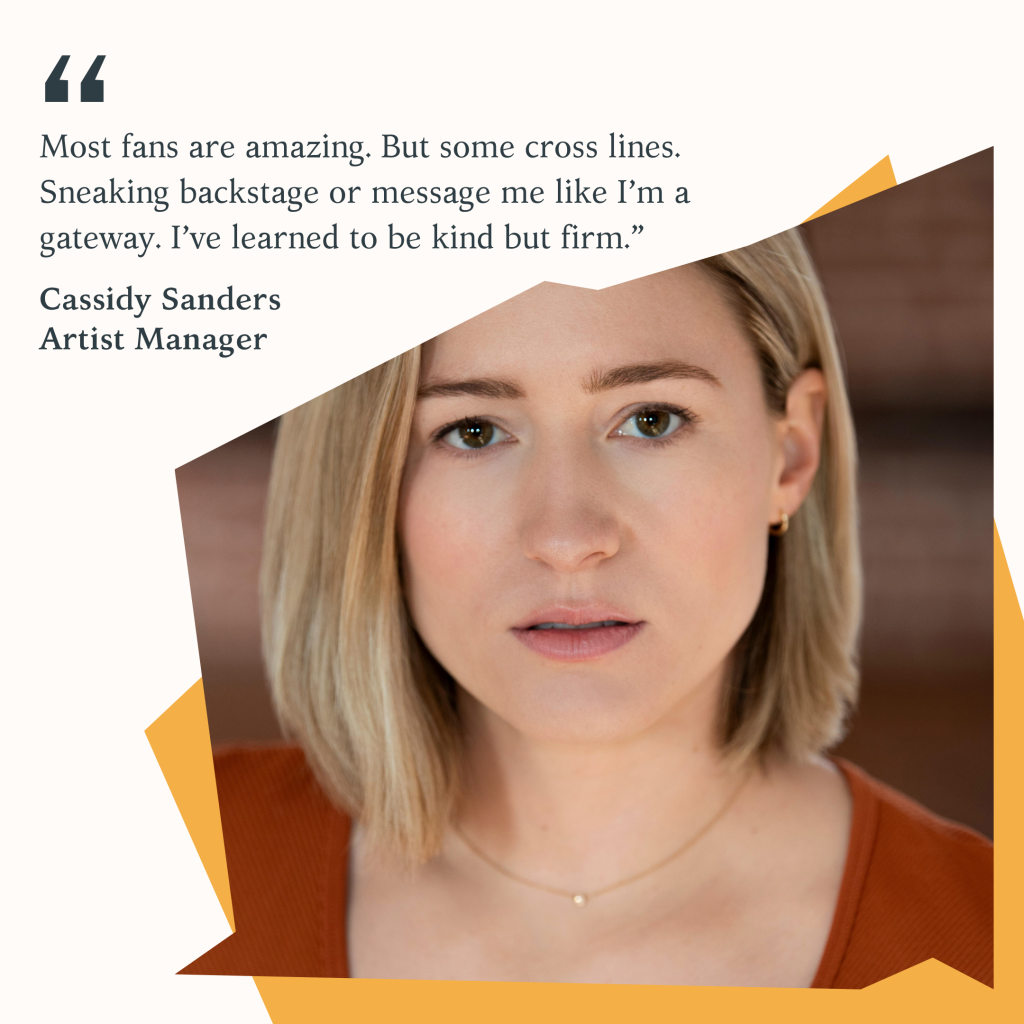In a world where fame is curated and chaos is constant, Cassidy Sanders has built a reputation as one of indie music’s most dynamic artist managers. Known for her calm presence and fierce loyalty to the creatives she represents, Sanders doesn’t just manage schedules—she manages energy, boundaries, and the emotional weight of the spotlight.
I sat down with her at a recent music industry forum to talk about what really happens behind the curtain of a successful artist’s career—and why being a manager means being a lot more than just business-savvy.
“The chaos has layers.”
When I asked Cassidy what her day-to-day actually looks like, she laughed knowingly.
“On the surface, sure, it’s scheduling, travel, interviews, promo, rehearsals, meetings with labels and brands,” she said. “But the real job—what people don’t see—is managing the energy around the artist. Their headspace. Their well-being. Protecting that at all costs.”
In her world, “everyone” is a potential distraction: fans with backstage ambitions, opportunistic business partners, or even well-meaning friends from the past. As Cassidy puts it, “I always say: part of my job is making sure the artist never has to worry about who’s in the room. I filter that. If you’re coming in with the wrong energy, you’re not getting past me.”
Ego is human. Friendship is essential.
Ego management is an art in itself, especially in an industry built on performance and perception.
“Ego in this industry is often a survival mechanism,” Cassidy explained. “Artists are putting their hearts on a stage and asking people to love it—or judge it. That’s vulnerable.”
That’s why Cassidy doesn’t keep her role strictly business. She builds genuine friendships with the artists she manages.
“If I don’t care about them as a human, I can’t do this job,” she said simply. “But friendship doesn’t mean enabling. It means knowing when to say, ‘Hey, you’re not seeing this clearly. Let me help,’ or ‘Let me handle this so you can focus on the show.’”
Record deals and brand partnerships? She filters first.

“I’ll never drop a stack of contracts on my artist’s lap and say, ‘Figure it out,’” she said. “I read it all, I highlight what matters, I explain the risks, the benefits. I’m the funnel.”
The same applies to brand deals. “If I wouldn’t put that product in their hand on a normal day, it’s a no,” she added. “And I’ll say no before the artist even hears about it, so they’re not burdened with turning everything down themselves.”
Boundaries: Fans vs. Friends
As any manager knows, some of the trickiest situations come not from industry partners—but from passionate fans who push a little too hard.
“Fans mean well—most of the time,” Cassidy said. “But some cross lines. Sneaking backstage, demanding autographs at dinner, messaging me like I’m their ticket to the artist? That’s a hard no.”
It’s here where Cassidy draws perhaps her firmest boundaries.
“I’m not here to be liked by fans. I’m here to protect the artist,” she said. “There’s a big difference between being friendly and being friends. I don’t blur those lines. If I start handing out favors or making backstage passes a popularity contest, I’m not doing my job.”
On staying grounded in a high-stress job
When your job is to take on someone else’s stress, how do you stay sane?
“Therapy. Sleep. Long walks where no one can find me,” Cassidy joked. But more seriously, she credited her community of other managers. “I’ve built a small network of people who get it. We call each other, vent, strategize, laugh about the madness.”
She added, “It’s easy to lose yourself in someone else’s dream. So I remind myself, regularly, why I’m doing this: I believe in the artist, and I believe in the art. If I keep that at the center, the rest sorts itself out.”
The job is invisible—if done right
Before our time was up, I asked Cassidy what she wishes more people knew about what she does.
“That we’re not just schedulers or dealmakers. We’re caretakers,” she said. “Of the artist, the vision, the ecosystem around them. And if we’re doing it right, no one even notices—because the artist looks effortless. And that’s the goal. Make it all look easy, so they can shine.”
*Cassidy Sanders is a Los Angeles-based artist manager known for her artist-first approach to navigating the modern music industry. She currently represents rising pop-singer Gwyn.


